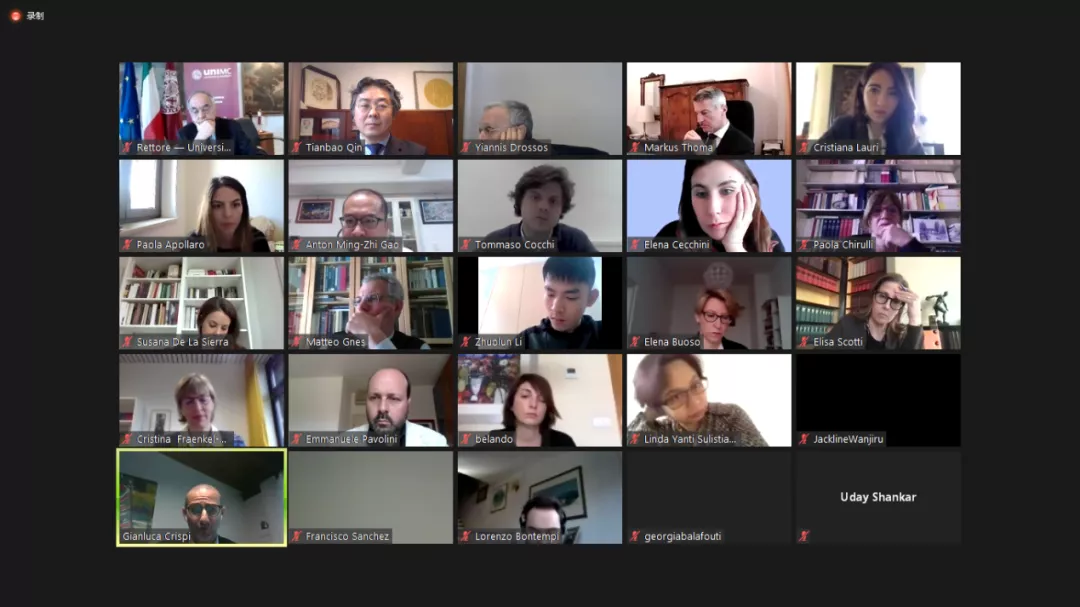On March 5th, an international seminar themed “COVID-19: Supranational, National and Regional Responses” co-organized by the Global Pandemic Network (GPN) and the United Nations Human Settlements Programme (UN-Habitat) was held online. Professor Qin Tianbao from Wuhan University was invited to attend the conference as a representative of Chinese mainland and gave a speech, telling audiences from various countries the story of China’s fight against COVID-19 in accordance with the law.

The Poster of the Seminar
This conference was divided into two parts. The first part was the experience of countries in Asia, Oceania, Europe, and Africa in responding to COVID-19. The second part was the experience of the United States, South America and other countries.
Professor Qin was the first speaker in the first part. He presented China’s legal response to COVID-19, showing the international community China’s efforts to use the rule of law to fight against the pandemic from four aspects: legislation, enforcement, justice, and international response. Professor Qin pointed out that in terms of legislation, China strictly conformed to the Law of the PRC on Prevention and Treatment of Infectious Diseases, Animal Epidemic Prevention Law of the PRC, Wild Animal Conservation Law of the PRC and other existing laws, and has introduced a series of legal documents focusing on strengthening market control, reining in illegal wildlife trade, restoring the livelihood economy, promoting people’s livelihood security and improving the treatment of healthcare workers. These actions have provided a strong legal basis for fighting the virus. In terms of law enforcement, China duly adjusted enforcement concepts, optimized implementation approach, carried out closed management in communities according to law, and emphasized the strengthening law enforcement and supervision in market economy activities, public health, and medical health. In terms of justice, China’s judicial authority has clarified the common accusations of crimes involved in the COVID-19 epidemic. China provided a standard for the proper handling of judicial cases in the context of the normalization of epidemic prevention and control by issuing guiding cases as well as uniforming case handling standards and implementing online litigation. In fulfilling its international obligations, China shared the gene sequence of the virus as soon as possible, and actively fulfilled its obligation of information notification under international law. China promptly controlled the infection source, cut off the transmission route, and effectively treated patients so as to buy time for other countries and regions to contain the outbreak. Chinese medical institutions have conducted timely and effective communication and cooperation with the World Health Organization (WHO). China has repeatedly sent expert groups to help other countries control the epidemic. Through his speech, Professor Qin comprehensively and systematically introduced China’s domestic measures and their effects in combating the virus as a country observing the law, and demonstrated China’s image of an international law defender in fulfilling its international obligations as a responsible major country, which was well understood and recognized by the scholars and audience.

Participants of the seminar
Nearly 30 experts from international organizations and higher education institutions such as UN-Habitat, Yale University (USA), Tulane University (USA), the University of London (UK), the University of Paris II (France), the University of Padua (Italy), the German University of Administrative Sciences, Sapienza University of Rome (Italy), the University of Macerata (Italy), the University of Urbino (Italy), the University of Trento (Italy), Bocconi University (Italy), the University of Rome III (Italy), Hassett University (Belgium), Sigmund Freud University (Austria), the University of Castilla La Mancha (Spain), the National University of Singapore, the Indian Institute of Technology Kharagpur, Makerere University (Uganda), Bar-Ilan University (Israel), and the University of Athens (Greece), and more than 300 listeners from all over the world participated.
The Global Pandemic Network (GPN) is a global academic organization that studies pandemic-related issues from the perspectives of law, economy, culture, society. It aims to provide a network platform for outstanding experts and scholars around the world to communicate with each other, to promote information sharing among global high-level academic institutions and to promote future research cooperation in frontier disciplines. GPN actively organizes web seminars, drafts scientific reports, and publishes academic journals. Since the global outbreak of the COVID-19 epidemic, GPN has built a platform for global experts and scholars to collect and share the latest developments about the virus. The first GPN network conference with the theme of combating the COVID-19 epidemic was held on July 15, 2020, and this meeting was the second one.
Rewritten by Li Sijie
Edited by Qin Zehao, Wei Yena, Zou Xiaohan
Source: https://fxy.whu.edu.cn/info/1051/10555.htm